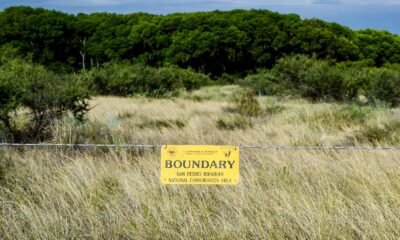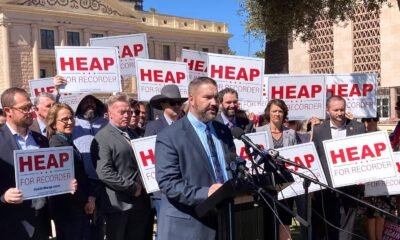Business
EPA Hands Over Carbon Injection Well Oversight to Arizona as Safety Risks Mount

Arizona has gained total authority over the regulation of underground wells designed for carbon capture, a decision announced by the Environmental Protection Agency (EPA) on Thursday. This shift comes in the face of growing concerns raised by environmental groups regarding the safety of such injections.
These underground injection wells, often referred to as carbon injection wells, aim to store carbon dioxide in liquid form, potentially mitigating the impacts of climate change. However, the technology remains largely untested and has encountered issues, including pipeline ruptures and leaks that have raised alarms about potential groundwater contamination.
In Texas, concerns are mounting over potential geological disturbances linked to carbon dioxide storage, such as increased seismic activity and blowouts. In light of these issues, Arizona’s Republicans and Governor Katie Hobbs welcomed the EPA’s decision, viewing it as a vital step forward.
“This authority is essential for safeguarding our groundwater resources,” Hobbs stated. “It empowers the state to lead in sustainable resource management and clean energy initiatives.”
The Arizona Department of Environmental Quality (ADEQ) submitted a formal application to the EPA in February 2024, seeking direct oversight of injection wells. The ADEQ aims to establish regulations tailored to Arizona’s hydrogeological conditions while prioritizing water protection.
A press conference in Washington, D.C., featured EPA Administrator Lee Zeldin alongside Arizona Congressmen Andy Biggs, Juan Ciscomani, and Paul Gosar. They commended the new policy, which they claimed fulfills promises made during the Trump administration to reduce regulatory obstacles.
Environmental organizations, however, express apprehension about the implications of this decision. In West Virginia, a recent lawsuit highlighted concerns regarding inadequate funding for state oversight of similar wells. Sandy Bahr, Director of the Grand Canyon Chapter of the Sierra Club, echoed these worries, emphasizing the necessity for stringent protections for Arizona’s drinking water.
“The lack of resources for ADEQ could jeopardize our groundwater safety,” Bahr warned, urging the agency to halt approvals for carbon storage wells until comprehensive protective measures are established.
Currently, there are no existing carbon injection facilities in Arizona, nor have any permits been applied for. Any facility intending to operate in the state will need to adhere to Underground Injection Control program requirements, ensuring the protection of underground sources of drinking water.
While the metropolitan areas of Phoenix and Tucson predominantly rely on the Colorado River for water, many regions of Arizona depend on underground aquifers. Concerns about potential leaks from carbon storage wells persist. “It’s not just about whether these wells will leak, but how much leakage will be permissible,” said Abel Russ, an attorney with the Environmental Integrity Project.
The regulatory changes also pave the way for permitting various types of injection wells, including those used in fracking processes. Previous environmental concerns have been highlighted in proposed projects such as helium fracking on the Navajo Nation and uranium mining in the Coconino Plateau, which threaten to contaminate groundwater.
The EPA will host a virtual public hearing on June 25, 2025, from 5 p.m. to 8 p.m., providing an opportunity for public input on the proposed regulatory changes.

















